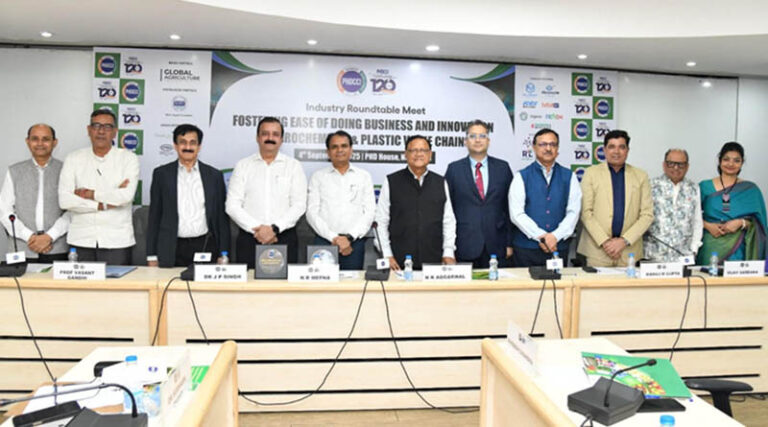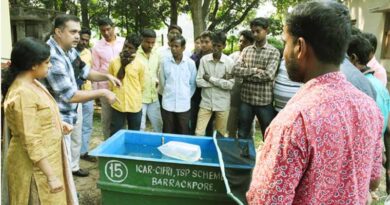
Ease of Doing Business vs. Spurious Pesticides: Agrochemical Industry Debates Reforms at PHDCCI Roundtable
06 September 2025, New Delhi: The PHD Chamber of Commerce and Industry (PHDCCI) hosted an industry roundtable in New Delhi to deliberate on “Fostering Ease of Doing Business and Innovation in Agrochemical & Plastic Value Chains.” The meeting brought together industry veterans, policymakers, regulators, and knowledge partners, who engaged in candid discussions on challenges facing the sector, including spurious pesticides, complex regulatory frameworks, and export barriers linked to Maximum Residue Limits (MRLs).
Ease of Doing Business vs. Innovation
In his welcome address, N.K. Agarwal, Chair of the PHDCCI Chemical & Plastic Committee, stressed that the ease of doing business is directly tied to industry growth. He argued that businesses spend nearly 70% of their time on regulatory compliance instead of innovation and R&D. “If this time is saved, the industry can channel its efforts into new technologies, product development, and growth ventures,” he said, urging for joint efforts between industry and government to simplify processes.
Too Easy? Industry’s Credibility at Stake
Veteran industry leader Salil Singhal, Chairman Emeritus, PI Industries Ltd., set the context by reflecting on decades of experience in the agrochemical sector. He observed that obtaining registrations—such as 9(4) licenses and manufacturing approvals—had become “too easy,” enabling the entry of companies with little credibility.
“This has caused chaos in the sector. Many newcomers are only interested in making quick profits by pushing spurious pesticides. The industry’s reputation is being damaged,” he warned. While ease of registration was once seen as a victory for business, Singhal insisted that the time had come to shift focus toward innovation and high-quality products that create real value for Indian agriculture.
Knowledge Partnership and White Paper Release
N.K. Arora, Secretary, Governing Council, Kisan Vigyan Foundation, introduced the Foundation’s role as a knowledge partner and unveiled its white paper on fostering ease of doing business and innovation in agrochemicals and plastics. He noted that the Foundation has previously released several policy-oriented papers on food and feed security, and this new document aims to provide actionable recommendations to regulators and ministries.
Representing the farmers’ perspective, Prof. Vasant Gandhi, Governing Council Member, Kisan Vigyan Foundation, highlighted that agrochemical innovation ultimately affects farmers most. He pointed to India’s declining pesticide use and linked it to falling productivity in crops like cotton, where India’s yields are just one-third of China’s.
Gandhi underlined several structural challenges: lengthy product registration timelines, different rules across states, redundant data requirements for globally approved products, and universities’ reliance on outdated chemical packages of practices. “Farmers are being denied access to modern, effective products while being stuck with old ones. This puts them at a clear disadvantage globally,” he said.
Legal Clarity and Misbranding
Rajvir Singh Rathi, Director – Agriculture Affairs & Policy, Bayer Crop Science Ltd., emphasized the need to differentiate between misbranded and spurious products, noting that both carry different legal implications. “Clubbing them together creates confusion. Instead of blaming the system, industry must work with government on the ‘how’ part of solutions,” he said, adding that collaboration, not confrontation, is the way forward.
Regulatory Progress and Challenges
From the regulatory side, Dr. Subhash Chand, Secretary, Central Insecticides Board & Registration Committee (CIBRC), shared updates on the government’s progress. He reported that over 1.70 lakh certificates had been issued in the past two years, with 12,000 certificates already issued in 2025, reflecting improvements in approval efficiency.
“We are working hard to match industry expectations and remove wrong registrations. Minor changes may be needed, but regulations are already designed to support growth when benchmarked globally,” Chand said, adding that CIBRC was open to dialogue with industry on necessary reforms.
Dr. J.P. Singh, Additional Plant Protection Advisor, Ministry of Agriculture and Farmers Welfare, highlighted India’s export challenges. He noted that consignments of paddy and fruits were being flagged internationally for high MRL (Maximum Residue Limit) levels, resulting in rejections. “This is directly impacting our farmers’ income and trade prospects. We must act urgently to align our systems with international standards,” he cautioned. He urged the industry to work closely with farmers to understand real-world practices and adjust product usage accordingly.
Industry’s Role in Policy Drafting
Concluding the session, Vijay Sardana, Chairman, Governing Council, Kisan Vigyan Foundation, argued that while ease of doing business has benefited industry, it has also opened the door to non-serious players. “Defunct companies are exploiting loopholes and flooding the market with spurious pesticides. We must tighten quality safeguards,” he said. Sardana also called on industry to take greater responsibility in policy drafting. “Government departments often lack domain expertise and resources. Instead of waiting for them to act, industry must draft ready-made policies and hand them over for correction and approval. This is the fastest way to remove bottlenecks.”
Ms. Gayatri Sharma, Director, PHD Chamber of Commerce and Industry, steered the roundtable discussions, ensuring smooth flow between diverse perspectives of industry leaders, policymakers, and knowledge partners. In her concluding remarks, she underlined that PHDCCI would compile the forum’s recommendations into a structured policy submission for relevant ministries, with the objective of creating a regulatory environment that fosters both innovation and responsible business growth in agrochemicals and plastics.
Also Read: India Slashes GST on Tractors and Agri-Inputs to Boost Farm Economy
📢 If You’re in Agriculture, Make Sure the Right People Hear Your Story.
From product launches to strategic announcements, Global Agriculture offers unmatched visibility across international agri-business markets. Connect with us at pr@global-agriculture.com to explore editorial and advertising opportunities that reach the right audience, worldwide.






